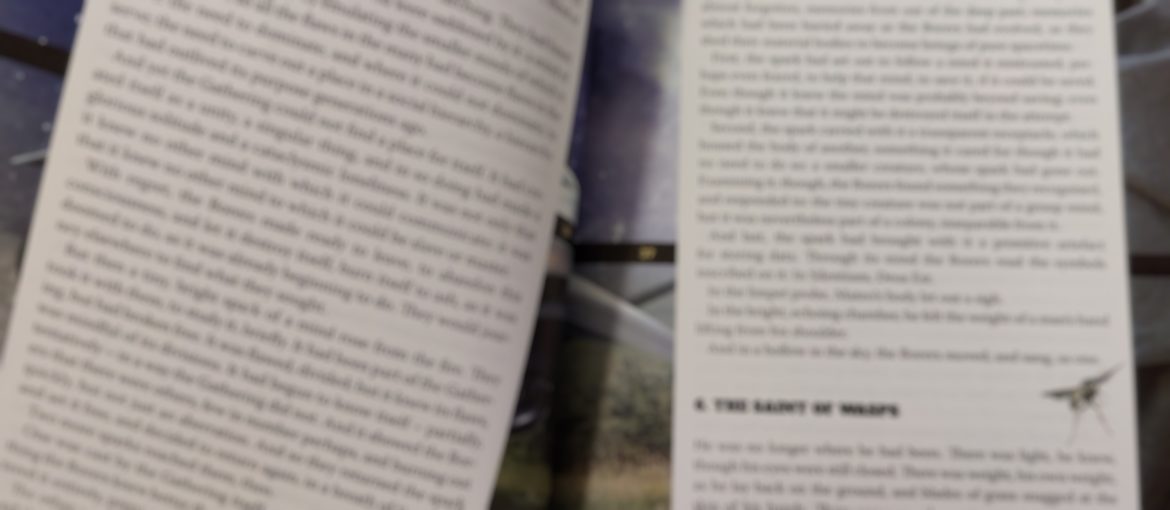A variety of stories read over a long period of time from a variety of sources. Actually includes some non-genre stories for once…
Shit Flower, Anil Menon. One of the most interesting and entertaining stories I’ve read in ages, and it is for the most part a story about shit. Yep, the artificial intelligences running Mumbai’s sewer systems have told each other a bad joke and now the city is overflowing with shit. The people in a position to stop this are Simon, an Indian-naturalised Canadian mathematician, and Ada, a senior official in the city’s waste management department. Simon is old now, but long before had consulted on the creation of those sewage AIs. Ada, young and exploring a total identity transplant, reaches out to him to combat the problem.
This story feels casually polymathic, roving across mathematics, heterogeneity in social stability, history, cross-linguistic jokes and so on, with a conclusion that is warm and welcoming of interpretation. Hindu reincarnation? SFnal identity injection? Why not both, or neither?
Absolutely a story to come back to, and Anil Menon is an author I also now need to revisit.
Abeokuta52, Wole Talabi. This story tells of the “Abeokuta 52” scandal from the point of view of Bidemi Akindele. Akindele’s mother was one of the first responders to an extraterrestrial impact near the Nigerian city of Abeokuta, and of these responders 52 were diagnosed with severe pulmonary fibrosis and lung cancer. All subsequently died.
In the ten years since the impact, Nigeria has grown prosperous by exploiting alien technology recovered from the impact site, whilst Akindele and other activists campaign for justice for those who died in defiance of official policy: “forget the past and embrace the future in silence”. The story is structured like a message board thread and begins with a copy-paste Guardian article by Akindele; the story developers in the comments that follow. These messages deftly expand and continue the story, driving toward a dark conclusion of collusion and greed.
The story reminded me of the grim end of Ken Saro-Wiwa and the Ogoni Nine in the mid-90s, or indeed the fates of many activists around the world who sought justice in the face of authoritarian government and extractive big business.
Exhalation, Ted Chiang. My first read of this multiple award-winning story. Set within a pocket universe surrounded by walls of impenetrable chromium and populated by sophisticated mechanical beings, who breathe pressurised argon extracted from an underground reservoir. These beings are sentient and sapient but in composition more similar to the clockwork automata of past futurities and the vacuum tubes of early computing than, say, the ‘positronic men’ of contemporary SF.
The protagonist is a scientist who speaks of two things: firstly the ongoing effort by its people to understand the inner working of their own brains, and secondly a succession of strange events where town criers reading precisely timed speeches are unexpectedly cut off by the ringing of bells before reaching their conclusion. The protagonist performs an act of self-dissection, believing these events are linked, and discovers a great truth.
This story essentially makes a modern fable of entropy and the second law of thermodynamics, explaining it by way of air pressure rather than energy exchange. Its phlegmatic acceptance of the inevitable, its lifting of its gaze outwards and forwards, its exhortations that pondering existence and finding common ground with the Other of a future that is impossible to know, are effective and deeply SFnal.
The Necklace, Guy de Maupassant. A “pretty and charming” girl born into a minor bourgeois family is married off to a minor government official. She is tormented by a feeling of entitlement: that her poor home and single servant are less than she is due, whilst she dreams of grand ornaments and armed footmen and vast rooms in a sprawling home, built for a life of idle leisure.
When M. and Mme. Loisel are invited to the home of a senior minister her husband is shocked that she is resentful, having little idea of her feelings, but turns over the money he has been saving so that she may buy a new dress, and suggests she borrows a necklace from a wealthy friend. With dress and necklace in place Mme. Loisel is able to enjoy the party, but on their return home she realises the necklace is lost. Visiting the jeweller they believe sold it, they are horrified to discover a replacement will cost 36,000 francs. By borrowing from multiple lenders and exhausting a bequest from M. Loisel’s father they are able to pay and spend the next decade living hand-to-mouth as they repay their debts. Subsequently, Mme. Loisel tells the friend from whom she borrowed the necklace what happened. Her friend is stunned, and tells her that the necklace was an imitation, worth a tiny fraction of what they paid.
The story obviously depends greatly on that brutal, ironic closing twist. It is difficult to be sympathetic with Mme. Loisel, entitled and dissatisfied as she is, but even so skewed a character doesn’t warrant the loss of ten years of life. Still, the point here is that she is brought low by her own character flaw.

